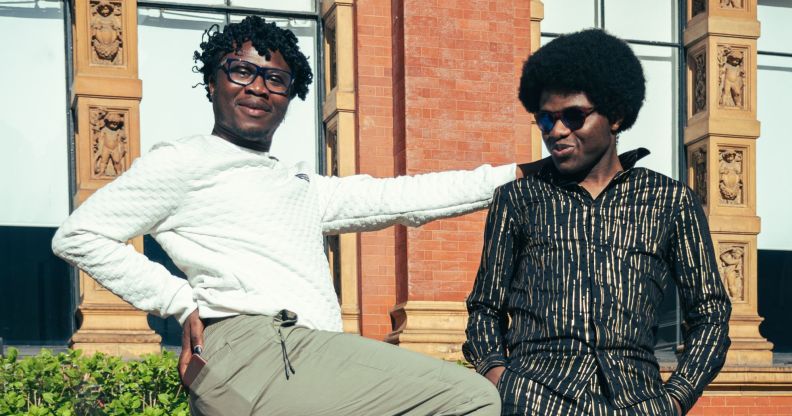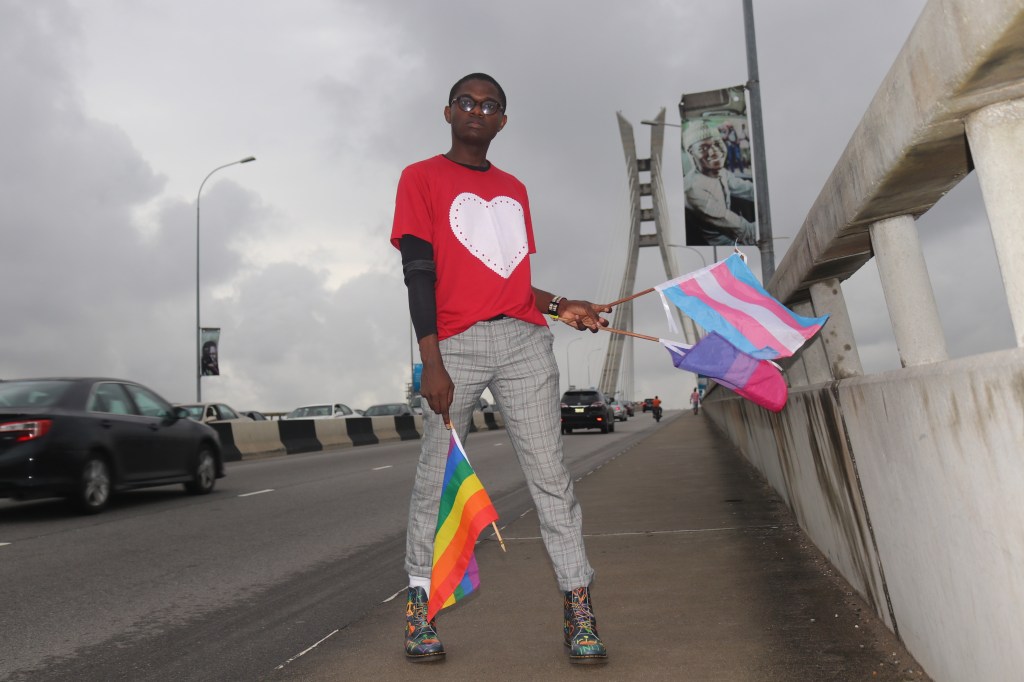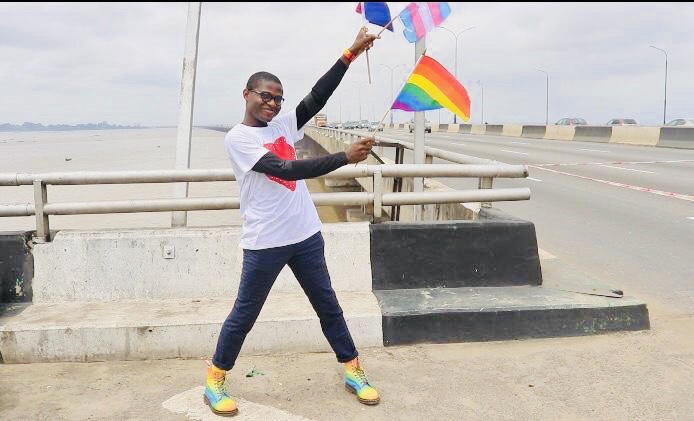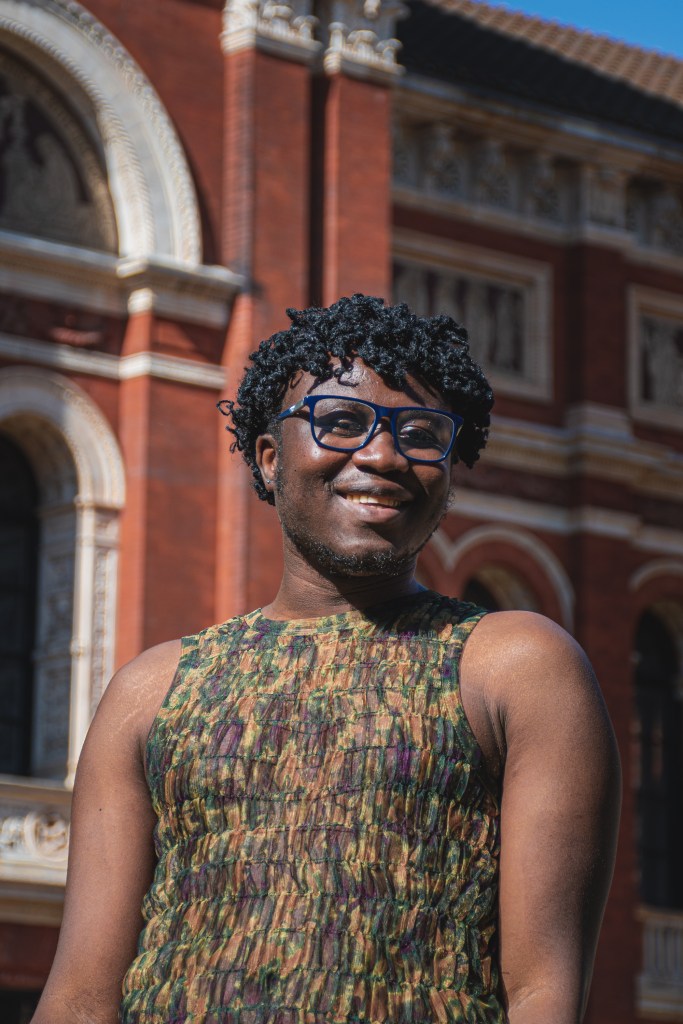LGBTQ+ refugees don’t feel safe in the UK: ‘Everything’s attacking us, we’re demonised’

Refugees Teslim and Joel reflect on the conditions they’ve endured in the UK. (Scarlett Novoa/IMIX)
Being an LGBTQ+ refugee in the UK means enduring appalling housing, homophobic housemates, and dealing with a racist system, two people with first-hand experience tell PinkNews.
When Teslim and Joel left their home countries, they expected to find safety and stability in the UK – but instead they’ve been stuck navigating an increasingly punishing system.
Much is made of the difficulties LGBTQ+ people face in obtaining asylum in the UK – they must provide evidence of their sexuality, and many are simply told that they can return to their home countries safely, despite evidence to the contrary. The government’s Illegal Migration Bill will make things even more difficult, with the intention of removing those who arrive via unapproved routes to anti-LGBTQ+ Rwanda, or another third country.
Teslim and Joel are among the luckier ones – they have both been granted refugee status by the Home Office. But their everyday lives are still made painfully difficult by systems and society.
From failures in housing and education that should have been resolved long ago, to outright discrimination and anti-refugee sentiment, the reality is that many are still suffering long after they’ve been granted asylum.
“Everything’s attacking us, and we’ve been vilified and demonised,” says Joel, 25.

‘My mom kept saying, this doesn’t feel right, you have to go’
Growing up in a deeply religious society in Nigeria, Joel, always knew he wouldn’t be accepted. They were targeted by homophobic bullies as a child, and people would ask why all their friends were girls.
“I was mostly the elephant in the room,” they tell PinkNews. “I had to bottle a lot up. There was no one to talk to, not until the dawn of the internet.”
As an adult, Joel decided to change society from the inside out. They organised a Pride demonstration in Abuja, but were met with resistance. Fearing retribution from the authorities, they packed up their things and fled.
“My mom kept saying, ‘This doesn’t feel right, you really have to go.’”
After landing in Heathrow, Joel said they wanted to claim asylum, which led to them being put in a detention centre. There, they were subjected to homophobic abuse from other inmates.
They were released after five days and they’ve since been granted asylum, but they’ve been unable to find any kind of stability in housing.
Joel recounts numerous instances of the abuse they’ve faced from housemates over the last few years.
In one chilling incident, a housemate broke into their room and destroyed all of their possessions in a fit of rage. Once, another housemate offered to protect them from the others, but it soon became apparent that he would only do so in exchange for sexual favours.

To this day, Joel is in limbo – they still have no permanent address. Even so, things are slowly starting to look up. They’re studying at Oxford University online and they’re currently living in relatively calm but temporary quarters.
As they’ve battled to find safety and security, Joel has been disturbed by rising anti-refugee sentiment. They’ve also been dismayed by some of the laws introduced by government which seek to clamp down on people seeking asylum in the UK.
“England’s position in all of Europe, it’s regressing, and that’s very telling,” Joel says.
“They pride themselves as this safe haven which isn’t really the case as you can see from my experience and others.”
They continue: “Most of us have come through no fault of our own. We had to flee our homes, we had to seek safety. We have to seek refuge here in the UK but we’ve been met with this harsh, harsh reality from the people, the government, the media. Everything’s attacking us and we’ve been vilified and demonised.
“I don’t get it when they vilify people who are already vulnerable and more than anything deserve love and kindness. They can do a lot better.”
Being outed meant that Teslim ‘lost everything’
Teslim grew up in a relatively affluent but heavily religious family in Sierra Leone. They knew they were queer from a young age.
“I had a secret I was afraid someone was going to uncover and it felt like I was walking on eggshells all the time,” he tells PinkNews.
Though he wasn’t out, he was “punished” at school for being different. Still, he thought he could grow up, get by and prove himself to his family, but that never came to pass.

In the end, he was outed against his will when an uncle he was staying with in Europe overheard him talking about a man he liked on the phone.
“He wasn’t happy about it. He told my dad that this is my life, I’m a prostitute here. It was horrible.”
Teslim’s father stopped speaking to him and he lost contact with his entire family.
“At some point I was the great son in the family and they found out I was gay and I sunk so low. It got to a point where there were no more lows to sink too.”
“In the space of a year or two I lost everything I had – everything, even to the point where my uncle kicked me out of his house. That was the only family I had [in Europe].”
In December 2017, Teslim got on a flight to England, where they planned to stay for a month. He claimed asylum in January after realising that it would be impossible to return home.
Today, Teslim is living in Leeds with a retired woman, a fellow medic, who has helped him get on his feet. He’s studying biomedical science at university, but he wishes he was studying medicine. He was rejected from the course despite the fact that he was already studying before arriving in the UK.
“Everything is harder for anyone who’s seeking asylum or a refugee,” Teslim says.
“The moment they hear that, so many doors are closed and yet people think refugees have it easy in this country and they’re coming here to take your jobs. No they are not. It’s really not easy being a foreigner here. Everything is against you. Every system is here to make you go crazy.”
As the UK marks Refugee Week, Teslim hopes people will take stock of just how badly anti-refugee sentiment has gotten out of control. Simply put, he just wants the chance to live his life freely and openly like everyone else.
“In the UK we don’t have an immigration crisis,” says Teslim, 28. “What we have is racism.”
The UK is marking Refugee Week from 19 to 25 June.
How did this story make you feel?

